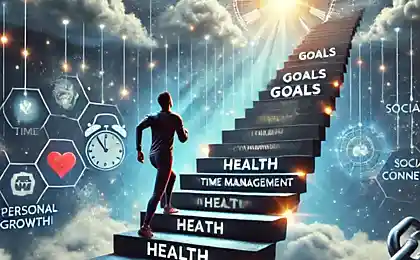170
5 Questions to Start Your Introspection If You’ve Never Done It
Self-analysis is a powerful tool for personal growth and self-discovery. It helps to understand your strengths and weaknesses, determine goals and ways to achieve them. If you’ve never done introspection, start with simple but profound questions. In this article, we will look at five key questions that will help you start this journey and make life more conscious and happy.

1. Who am I and what is important to me?
The first step in self-examination is understanding your identity and values. Ask yourself:
2. What are my strengths and weaknesses?
Being aware of your strengths and weaknesses is an important aspect of introspection. Think about it.

Knowing your strengths and weaknesses allows you to effectively use your resources and work on improving those aspects that require attention.
3. What are my goals and dreams?
Defining goals and dreams helps to channel effort and energy in the right direction. Ask yourself questions:
Setting clear goals promotes motivation and helps track progress.
4. How do I cope with difficulties and stress?
The ability to cope with difficulties and stress affects your mental health and overall well-being. Think about it.

Developing effective stress management strategies helps maintain balance and productivity in challenging situations.
5. What is my relationship with others?
The quality of your relationships plays a key role in your happiness and life satisfaction. Ask yourself questions:
Working to improve relationships promotes emotional well-being and support during difficult times.
How to use the results of self-analysis
Once you’ve answered these five questions, it’s important to use your insights to make real changes.
Self-analysis is a powerful tool for understanding yourself and improving your quality of life. By starting with simple questions, you can gain a deeper understanding of your desires, needs, and opportunities. Don’t put off introspection for later – start today and you’ll see how the changes will lead you to a happier and more conscious life.

1. Who am I and what is important to me?
The first step in self-examination is understanding your identity and values. Ask yourself:
- What are my core values?
- What is really important to me in life?
- What character traits do I want to develop in myself?
2. What are my strengths and weaknesses?
Being aware of your strengths and weaknesses is an important aspect of introspection. Think about it.
- What am I particularly good at?
- What skills should I develop?
- What weaknesses prevent me from achieving my goals?

Knowing your strengths and weaknesses allows you to effectively use your resources and work on improving those aspects that require attention.
3. What are my goals and dreams?
Defining goals and dreams helps to channel effort and energy in the right direction. Ask yourself questions:
- What are my short- and long-term goals?
- What do I want to achieve in my personal and professional life?
- What dreams do I want to make a reality?
Setting clear goals promotes motivation and helps track progress.
4. How do I cope with difficulties and stress?
The ability to cope with difficulties and stress affects your mental health and overall well-being. Think about it.
- How do I react to stressful situations?
- What methods do I use to reduce stress?
- How can I improve my coping skills?

Developing effective stress management strategies helps maintain balance and productivity in challenging situations.
5. What is my relationship with others?
The quality of your relationships plays a key role in your happiness and life satisfaction. Ask yourself questions:
- How do I interact with friends and family?
- What relationship is important to me?
- How can I improve my social connections?
Working to improve relationships promotes emotional well-being and support during difficult times.
How to use the results of self-analysis
Once you’ve answered these five questions, it’s important to use your insights to make real changes.
- Create an action plan: Based on your answers, develop specific steps to achieve your goals.
- Watch your progress: Regularly evaluate your achievements and adjust the plan if necessary.
- Seek support: Don’t be afraid to reach out to friends, family or professionals for help and advice.
- Continue your self-development: Introspection is a continuous process. Ask yourself new questions regularly and strive for self-improvement.
Self-analysis is a powerful tool for understanding yourself and improving your quality of life. By starting with simple questions, you can gain a deeper understanding of your desires, needs, and opportunities. Don’t put off introspection for later – start today and you’ll see how the changes will lead you to a happier and more conscious life.
Why a second date is more important than a first date
How to introduce yourself without embarrassment and make more new acquaintances























